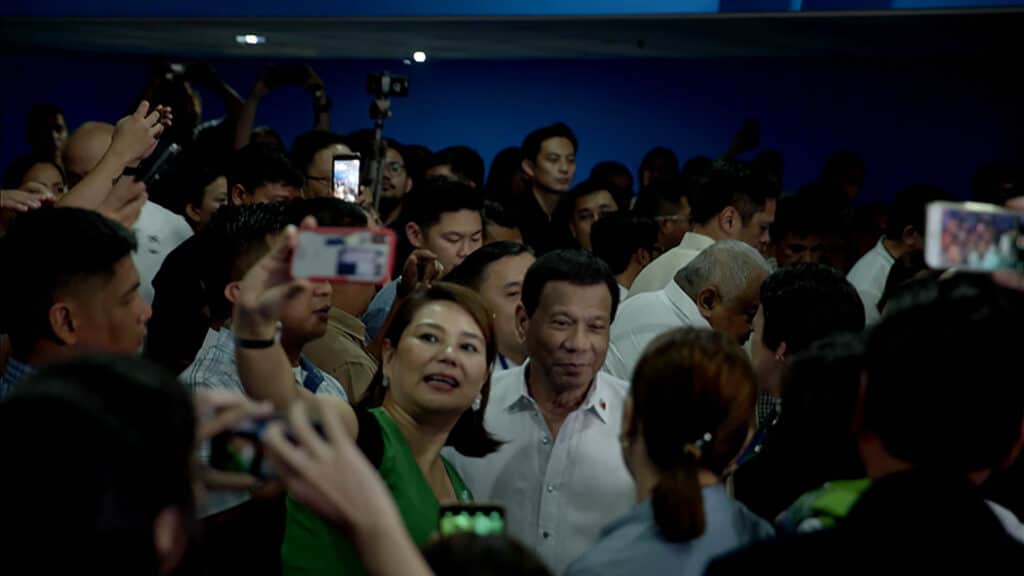Read also:
How to Watch FX Live Without CableHow To Watch AMC Without CableHow to Watch ABC Without CableHow to Watch Paramount Network Without CableRamona S. Diaz’s latest documentary showcases Filipino journalist Maria Ressa’s fight against Philippines president Rodrigo Duterte.
In 2016, a sexist septuagenarian with a hatred for journalists was swept into office by promising a return to greatness. Decrying traditional media outlets as “fake news,” supporters used alternative news sites and social media to spread their candidate’s message. When he won, the media and his critics claimed it signaled a great blow, if not the end, to democracy in the country. The candidate was Rodrigo Duterte, running for President of the Philippines.
I’m sure, astute Spool reader, that you saw through this rather obvious “bait and switch.” Even if the above is a tad cliché, the similarities between Trump and Duterte are at the heart of Ramona S. Diaz’s latest documentary, A Thousand Cuts. The film, which will be distributed to theaters by PBS Frontline with a later broadcast in the fall, is a current look at the state of the press in Duterte’s Philippines. Diaz intertwines depictions of Duterte and his supporters’ political action in the country alongside the strides Maria Ressa and her news outlet, Rappler, to expose the truth behind the president’s propaganda.
A Thousand Cuts oscillates between three main plotlines. First is Duterte and his political allies’ coalescence of political power in the country using an authoritarian populist campaign. For those unfamiliar with the political situation in the Philippines, Duarte’s main policy promise was to end the drug trade in the country. To do this, his administration authorized extrajudicial murders of drug users and dealers. Duterte and his supporters praised this tactic using social media and accusing—and later charging—journalists with libel.

The second plot arc focuses on Ressa and Rappler, which has been an outspoken critic of the administration and its disregard for the Philippines’ democratic norms. Ressa herself has become an international figurehead for journalistic freedom and was named as one of Time Magazine‘s Persons of the Year in 2018 along with a cadre of respected journalists. Finally, the documentary briefly explores the way that the Internet, particularly social media, allows misinformation to spread and breed, as well as the importance of credible investigative journalism to provide the truth.
From a structural perspective, Diaz moves between these three plots as that narrative sees fit. The inference from this structure is that the three are integrally linked. Rappler’s activism is a response to Duterte, and that activism in turns causes Duterte and his supporters to retaliate. It’s clear that both the film and its subject Ressa view this as a chilling encroachment on personal liberty by the government. The most prominent use of scoring in the film is haunting, ambient background music that’s more suited to a supernatural horror film than a documentary.
Underpinning the back and forth between Rappler and the government is the influence that the Internet has on the public narrative. Online activity is laid over footage. Mocha Uson, a Filipino pop star turned political appointee, gives an impassioned monologue in support of Duterte on Facebook. As the footage rolls, we see the likes and heart reactions flood the screen, and Facebook comments and Tweets of supporters flash on screen. Footage of events is overlaid with the articles written about them, as well as comments from the public. This is genius visual storytelling that demonstrates the immediacy in reporting and public reaction the Internet has enabled, for better or worse.
Despite its focus on these larger forces, Diaz engages viewers on a very personal level. Front and center is Ressa, affable and competent, an inspiring yet unassuming public figure with a great sense of humor. The documentary’s portrayal of Duterte is made up of public speeches featuring his most inflammatory languages: promises of violence and jail against his enemies, jokes about his sexual prowess, and sexist remarks. By removing any sense of intimacy with Duterte, Diaz shows him more as a political force than a personal antagonist.
A Thousand Cuts a is required viewing because it brings attention to the civil rights abuses occurring now in the Philippines, smartly implying how this illiberalism could happen elsewhere.
The film humanizes Duterte’s supporters, including the aforementioned Uson, a bit more. Meanwhile, General Bato, a former corrections official who runs for Senate, has the self-awareness to acknowledge that his killing drug users is in contradiction with his strong Catholic beliefs. In contrast to the Dutertes, who are portrayed as being in politics for the power and money, the film at least leaves open the possibility that supporters believe the harsh treatment of drug users and dealers is in service to improve life in the country.
A Thousand Cuts a is required viewing because it brings attention to the civil rights abuses occurring now in the Philippines, smartly implying how this illiberalism could happen elsewhere. In a scene where Ressa is talking at a forum held by The Atlantic, she delivers an anecdote that the Cambridge Analytica whistleblower states they used the Philippines and other less stable democracies as test cases, and tactics that worked were “ported” to the United States and Europe. As an American viewer, it’s easy to see Duterte as a more overt Trump. Trump uses dog whistles. Duterte shouts.
But despite the often depressing and downright terrifying events of the documentary, we are given hope through Ressa, without whom A Thousand Cuts would feel hopeless. Despite the corruption and extrajudicial murder taking place, she still believes that the Philippines can and will be a better place. The documentaryserves as both a warning to the international audience, but also a reminder that we have the tools to fight and resist authoritarianism, but we must strive to preserve the institutions that protect democracy.
A Thousand Cuts debuts in select theaters and virtual cinemas this Friday, August 7.